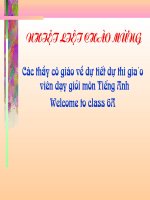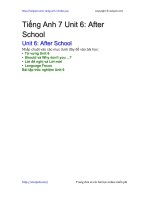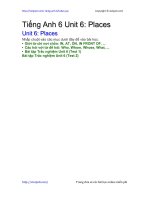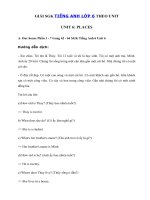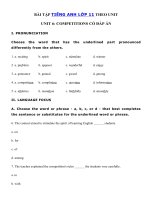Unit 6:
Bạn đang xem bản rút gọn của tài liệu. Xem và tải ngay bản đầy đủ của tài liệu tại đây (100.65 KB, 11 trang )
UNIT 1
I. Vocabulary
1. I find Peter is not communicative. He’s rather _______ in public.
a. kind
b. reserved
c. sociable
d. humorous
2. Nam is an _______because his parents died last year.
a. child
b. orphanage
c. boy
d. volunteer
3. I _______ a letter from my old friend last week.
a. sent
b. gave
c. received
d. volunteer
4. What is your new classmate like? – She’s not very beautiful, but she’s ______.
a. ugly
b. lucky
c. my cousin
d. a sociable girl
5. I have many friends, and all of them have different ___________.
a. moods
b. feelings
c. characters
d. voices
6. Tom has a good sence of ___a. humorous b. humorc. humored
d.
humourist
7. Lan is Hoa’s _______ friend.a. best
b. better
c. the best
d.
bestest
9. I enjoy ______ jokes.
a. talking
b. speaking
c. saying
d.
telling
10. Don’s speak ___ him now. He is not feeling very well.a. at
b. to c. with
d. about
II. Choose the best answer (tenses)The sun ______ in the east.(rises/ rise/ is
rising/ to rise)
1. Water ____ at 100 degrees Celcius. (boiled/ boils/ to boil)
2. Silver _____ cheaper than gold. (is/ are/ were/ was)
3. Spiders ______ six legs. (have/ has/ is/ had)
4. Her mother _______ this city two years ago. (left/ leaves/ is leaving/ to leave)
5. “Would you ______ to go to the movies with me?” – I’d love to. (like/ want/
love/ mind)
6. I’m sorry. I ______ see you yesterday.(don’t/ b. can’t/ couldn’t/ am not able to)
7. She ______ a letter from her old friend yerterday. (to receive/ is receiving/
receives/ received)
8. The River Amazon ______ into the Atlantic Ocean. (flow/ flows/ flowed/ is
flowing)
9. She ______ long hair. (have/ has/ is having/ had)
III. Combine each of the following pairs of sentences into one sentence,
using (not) adj + enough + to inf.
1. He is tall. He can play volleyball.
2. My sister is old. She can drive a car.
3. This coat isn’t warm. I don’t wear it in winter.
4. Mr. Robinson isn’t rich. He can’t buy a house.
5. The tea isn’t strong. It won’t keep us awake.
6. The worker is clever. He can make fine things from wood.
7. The weather was fine. We could go camping.
8. The little boy is not strong. He can’t lift the suicase.
IV. Read the passage carefully, then answer the questions.
Do you have any close friends? I think everybody at least has one close friend
in their life. And so do I. I have two close friends, Hanh and Mai. We are in the same
class at the primary school. We are also neighbors so we spend most of our time in
learning and playing together. Hand is a beautiful girl with big black eyes and an
oval rosy face. She likes reading, and she often goes to the library whenever she
has free time. Mai isn’t as beautiful as Hanh, but she has a lovely smile and looks
very healthy. Mai is very sporty. She spends most of her free time playing sports.
Mai is a volleyball star of our school. She is also very sociable and has a good sense
of humor. Her jokes always make us laugh. I love both of my friends and I always
hope our friendship will never died.
1. Does the author have any close friends? What are their name?
2. What does Hanh look like?
3. What does she often do in her free time?
4. In Mai more beautiful than Hanh?
5. What’s Mai’s hobby?
6. Which sport does Mai play in the school team?
7. What’s Mai’s character?
8. What does Hanh often do in her free time?
V. Write
1. Rearrange
1. in/ the/ rises/ east/ the/ sun.
2. time/ I / most/ my/ with/ spend/ of / Hoa.
3. is/ she/ as/ Mai/ outgoing/ not/ as.
4. a/ reiceived/ Lan/ letter/ yesterday/ her/ friend/ from.
5. she/ hair/ black/ has/ long/ straight.
6. awful/ an/ what/ house!
7. is/ lucky/ to/ the/ enough/ have/ a/ friends/ lot/ of.
1. Write a paragrap about Trung, using the information in the box.
Name: Nguyen van Trung
Appearance: tall, fat, short curly
hair
Characters: socialbe, generous,
kind
Address: 14 Lac Long Quan
Street, Dalat
Family: mother, father and two
eler brothers
Hobbies: playing badminton,
swimming
Friends: Nam, Minh, Hung
UNIT 2
Odd one out
1. telephone
fax
computer
ticket
2. arrange
introduce
invent
concert
3. teacher
uncle
cousin
aunt
4. conducted
invited
agreed
emigrated
5. during
inside
outside
upstairs
6. hospital
exhibition
doctor
patient
I. Choose the best answer.
1. What is your new phone ___? – 112 638312.a. dial
b. letter
c. figure d.
number
2. I’d lide to make a ____ to 25555634, please.a. dial
b. call
c. ring
d.
phone
3. Can I ______ a message for Daisy?a. let
b. ask
c. leave
d.
make
4. They ______ from Canade to Americe to find work.
a. started
b. demonstrated
c. delivered
d. emigrated
5. He’ll come _____ to pick you _____a. on/ in b. over/ in c. in/ up
d. over/ up
6. Deaf-mutes can _____ speak ____ hear.
a. both…and b. not only…but also
c.neither…nor
d. either…or
7. A. G. Bell _______ the telephone.a. conducted
b. invented c. worked
d.
demonstrated
8. We’re going to the drama club. Would you like to ____ us?
a. join
b. see
c. meet
d. watch
9. ____ I speak to Mr. John, please?a. Can
b . Do
c. Will
d. Shall
10. You can ______ him at 343047599.a. see b. come
c. reach
d.
meet
II. Write the sentences with “be going to”
1. I/ travel/ Hanoi/ plane.
2. We/ do/ shopping.
3. I/ play/ table tennis/ evening.
4. Our friends/ meet/ us/ airport/ tonight.
5. She/ do/ homework/ tonight.
6. Hoa love children. (be a teacher)
7. Lan is learning to dance. (be a dancer)
8. Are/ you/ what/ going/ do/ to/ next weedend? ( rearrange)
9. Nam and Ba/ visit/ my grandmother/ going/ tonight/ to/ are. ( rearrange)
10.Pilots/ Tom and I/ to/ going/ be/ are. ( rearrange)
III. Fill in the blank with a suitale preposition.
1. The post office is not far ____ my house.
2. Let’s meet ______ the Blue Sky Theater tonight.
3. She was born _____ May 4th , 1990 ____ Dalat.
4. He worked ____ deaf – mutes _____ Boston University.
5. Mrs. Lien said you could reach her ____ 340450458
6. Snow is falling all _____ the country.
7. Will you pick me ____ after the party?
8. The secrectary took a message ____ her boss.
IV. Read the passage then answer the questions.
G. Bell was born in Scotlan in 1847, but when he was a young man of twenty –
three he moved withhis parents to Canada. Before the year was over, young
Graham had left his family and gone to Boston. Though Bell was a dreamer, he also
a practical thinker and a man of action. In Boston, where he worked by day as a
teacher of the deaf, he worked far into the night experimenting with the electrical
transmission of the sound. This led to the invention of the telephone.
1. Where was G. Bell born?
2. When did he emigrate to Canada?
3. When did he go to Boston?
4. Who did G. Bell work with in Boston
5. What did he experiment with in Boston University?
6. Who invented the telephone?
VII. Write
1. A: I/ going/ party/ tonight.
B: What/ you/ wear?
2. Let’s/ meet/ outside/ theater/ 6.30 p.m.
3. I/ not go/ you now/because I/ do/ homework.
4. A. G. Bell/ started/ experiment/ ways/ transmit/ speech/ over/ long distance.
5. Bell/ worked/ people/ neither speak/ hear.
UNIT 3
I. Choose the best answer.
1. The children are old enough to look after ________.
a. themselves
b. ourselves
c. herself
d. for themselves
2. Did you succeed ____ the problem?
a. to solve
b. on solving
c. in solving
d. solving
3. You must not let children play in the kitchen. The kitchen is a _______ place.
a. suitalbe
b. interesting
c. dangerous
d. quite
4. The rice ______ is next to the stove.
a. steamer
b. frying pan
c. pan
d. cooker
5. You have to keep all dangerous objects out of children’s ________.
a. eye
b. reach
c. hand
d. arm
6. You must cover _____________ so that children do not try to put anything into
them.
a. scissors
b. electrical sockets
c. knives
d. beads
7. Don’t let your child ____ with matches.
a. play
b. hold
c. see
d. do
8. Last night I watched the movie Romeo and Juliet. At last they killed _____.
a. together
b. each other
c. themselves
d. them
9. You’ll ______ cook dinner yourself..
a. ought to
b. must
c. should
d. have to
10. We ought _____ the wardrobe in the corner opposite the bed.
a. put
b. to put
c. putting
d. puts
II. Reflexive pronoun (đại từ phản thân)
1. My sister often looks at ________ in the mirror.
2. Mark made ________ a sandwich.
3. This refrigerator defrosts ________.
4. Hoa and I _______ saw that accident yesterday.
5. Did you pay for ___________?
6. The children can look after __________ for a few days.
7. Please help me. I can’t do it _______ .
8. Take care of ______.
III. Complete the passage.
This book will tell you about all the (1)______ you can take to (2)______ fires.
It also tells you what you can do if a fire (3)_______. It tells you how to (4) ______ the
alarm and how to try (5) ________ to the fire. Its even tells you what to say on the
phone when you (6) _______ the fire bridgade.
1. a. limit
b. precautions
c. allowances
d. stops
2. a. destroy
b. set
c. prevent
d. finish
3. a. starts up
b. sets out
c. breaks out
d.
catches
4. a. raise
b. send
c. call
d. make
5. a. die down
b. put for
c. give away
d. end
off
6. a. send for
b. call off
c. ask for
d.
bring to
IV. Read the passage then write T or F.
Every year, there are millions of accidents in our homes. Many people die
each year from these accidents. Other people spend many months in the hospital.
Many people fall when they try to reach for things in high places. They fall
because they stand on tables or chairs. Never stand on a chair or table. Many
people fall on things on the floor, so never leave toys or shoes on the floor where
you walk.
Fires kill many people in their homes each year. There are more fires in the
homes of smokers. Some people drop burning cigarettes into garbage cans. They
may start a fire in thd garbage cans. In a safe home, people do not keep old
newspapers, clothes and furniture. It is easy for these things to burn.
What should we do if there is a fire in your home? You and your family
should get out of the house quickly. Do not try to take anything with you. After you
leave the house, call the fire department from your neighbor’s house. Firemen will
come to put out the fire.
1. Some people have to go to the hospital from accidents in the homes.
2. You shouldn’t stand on a table to reach for things in high places.
3. A chair is a safe thing to stand on.
4. It is easy to fall on a floor with toys and shoes on it.
5. It is safe to put cigarette ends in the garbage cans.
6. Old newspapers, clothes and furniture are easy to start a fire.
7. In a safe home, people keep lots of old newspapers.
8. Take only expensive things with you when there is a fire in your home.
V. Write a description af Hoa’living room. Use the sets of words and
phases provied.
1. This/ Hoa’s living room.
2. There/ a rug/ in front of/ fireplace.
3. A dog/ lying/ rug.
4. On the fireplace/ there/ a mirror.
5. There/ some pictures/ wall/ near mirror.
6. The TV set/ be/ shelf/ next to/ lamp.
7. The books/ be on/ sofa.
8. There/ a plant/ behind/ sofa/ in front of/ window.
9. In the middle/ living room/ table/ four chairs.
10.Lighting fixture/ above/ table/ beneath/ lighting fixture/ vase with flowers.
UNIT 4
I. Odd one out.
1. a. cruel
b. unkind
c. greedy
d. generous
2. a. poor
b. lucky
c. happy
d. fortunate
3. a. wise
b. clever
c. foolish
d. magical
4. a. exciting
b. boring
c. interesting
d. fascinating
5. a. fit
b. tell
c. fall
d. feel
6. a. kill
b. live
c . cook
d. choose
7. a. did
b. had
c. see
d. brought
8. a. friendly
b. magically
c. fortunately
d.
immediately
9. a. aunt
b. nephew
c. niece
d. grandmother
10.a. beside
b. behind
c. beneath
d. because
II. Choose the best answer.
1. When I was a child, I _______ follow my Mom to the market.
a. used to
b. like
c. get used to
d. usually
2. Cam’s mother was very ____.a. beautiful b. ugly
c. cruel
d. happy
3. When did the prince fall in love ______ the princess?a. to b. at c. with
d. for
4. Do you know John is marred ____ Ann? a. with
b. at
c. on
d. to
5. We must be there ________ 7.30 and 8.00.a. from b. between c. before
d. at
6. I used to ______ my younger brothers and sisters.
a. see
b. have
c. look after
d. visit
7. Her grandfather used to be a ______ during the Revolutionary War.
a. nurse
b. doctor
c. soldier
d. firefighter
8. Little Pea had to do ______ all day. a. chores
b. homeworkc. excercises
9. I used to live ___ a farm. a. in b. at
c. on
d. with
II. Use the correct form or tense of the verbs in brackets.
1. They _______ (award) him a medal for bravery last year.
2. Mr. Brown used _______ (play) football when he _____ (be) young.
3. Mozart ______ (start) ______ (compose) at the age of five.
4. ___ you ____ (go) out last night?
5. What ____ you ____ (use) to do in your free time? _ I used to go fishing.
6. My parents used _____ (live) in Hue. They _____ (be) born and ______(grow) up
there. In 1969, they _____ (move) to Da Nang and then to Saigon. At present
we ___ (live) in a small house in Ho Chi Minh City.
III. Fill in the blank with a suitable preposition.
1. They got married ___ December 2000.
2. I’ll see you ___ Sunday, April 4.
3. We’ll arrive _____ 5 o’clock ____ 12 February.
4. What do you usually do __ the weekend.
5. It’s often rain ___ May.
6. Do you give each other presents ____ Christmas Day?
7. I haven’t seen him for ages. I last saw him ____ 1985.
8. They often go out for dinner ___ Saturday evenings.
IV. Read the passage then answer the questions.
Hello! My name is David. I work for a construction company. I have worked for this
company for nearly 5 years. We build roads, dams, bridges and things like that. At
the moment my company is producing a plan for a new motorway. I usually work in
the roads department, but this month I am working in the department that builds
bridges. So my whole working day is different just now. I normally spend a lot of
time outdoors, because I have to go to the construction sites. But with this new
project I spend a lot of time in the workshop. Now I am testing a model of one of the
new bridges. I enjoy it a lot, because I have learned a lot of new things.
1. How long has David worked for his construction company?
2. What is his company doing at the moment?
3. Where does he usually work?
4. Is he working in the roads department this month?
5. Why does he normally spend a lot of time outdoors?
6. What is he testing now?
VI. Write the sentences, using the cue words.
1. We/ not go/ school/ Saturdays.
2. They/ usually/ hold/ party/ New Year’s Eve.
3. I/ going/ see/ Jane/ lunchtime.
4. Last night/ she/ come home/ 10.30 and 11 o’clock.
5. Jazz/ become/ popular/ United States/ the 1920s.
6. I/ call/ you/ Friday afternoon/ about 2.30.
7. The first man/ walk/ moon/ 21 July 1969.
8. We/ often/ have/ short holiday/ Christmas.
UNIT 5
I. Choose the correct answer:
1. They usually …………… and highlight only the words they want to learn.
( underline / underlined / understand / understood )
2. She works very…………… ( hard / hardly / harder / bad )
3. Mr. White …………her to stand up. ( tell / say / speak / asked )
4. I am …………to be able to help.
( pleased / please / pleasure / pleasing)
5. He got good grade ………… Math. ( in / on / at / for )
6. His parents are always proud…………… him. ( on /of / at / for)
7. Mary was born in France. French is her…………( mother tongue / second language
/ foreign language).
8. He does morning exercises………… improve his health. ( in order for / in order to /
so )
9. Lan came ………… an old friend this morning. ( with / along / across / over )
10. Please wait ………… me a few minutes. ( in / of / for / at )
II ./ Fill in each blank with a suitable preposition :
1. They got married………..December 1996.
2. I’ll see you …………Sunday ,
April 2st .
3. What do you usually do ……….. the weekend ?
4. It often rains ……… May.
III./ Put the following commands and requests into reported speech :
1. The teacher said to Tim “ Come into my office”
2. Their mother said to them “ Don’t make so much noise”
3. Mrs Jackson said to Tim “ Could you give me a hand, please?”
4. Nam said to the taxi driver, “ Please turn left to the first traffic light”
5. She said his son , “ Go straight upstairs and get into bed”
6. Mary said to John, “ Can you carry my suitcase , please?”
IV. Report the doctor’s advice to Mr. Robinson :
1. “ You should take a few days off.”
2. “ You should take these medicines every four hours”
3. “ You ought to keep your body warm”
4. “ You shouldn’t drink alcohol or wine”
5. “ You ought not to eat fatty food”
6. “ You should take a little hot milk before sleeping”
V. Read & translate the passage into Vietnamese:
a. I have a little notebook. It’s an address book with the letters of the alphabet, and
I write the new words in two or three times a week. I write the English words first,
then the translation, and a short sentence as an example. I try to learn ten new
words a day.
b. I have a little notebook. I always have it with me. I try to fill one page a day.
Sometimes I put words in groups, like fruit – all kinds of fruits, you know? Or color,
or clothes, or things and the shops where you buy them. I have some grammar
pages where I write irregular verbs, or a page for prepositions. I think prepositions
are difficult, you know – on Sunday, in the morning, listen to music – but you say
phone someone. In Vietnamese, we say “ phone to someone”.
VI. Write a letter, using the following cues:
Your address: 345 Le Loi Street, Thanh My, Don Duong, Lam Dong
Date: January 20, 2007
Your name: Tuan Minh
Your pen pal’s name: Peter
1. Thank / letter
2. glad / hear / you / pass / exam.
3. I / finish / first semester / last week.
4. I / good grades / English / Math.
5. History / not very good.
6. I / try harder / next semester.
7. I / visit / grandparents / last Sunday.
8. They / happy / see / me.
9. Write / me / soon.
10. Tell / school / family.
UNIT 6:
I. Choose the correct answer:
1. Can you fill ……… this form for me? ( in / ot / at )
2. A. May I help you?
B. …………………………… ( What can I do for you? / Yes. That’s very kind of you. /
How can I help?)
3. Ten countries participated in the discussions. ( took part / told / said )
4. I got ……… when I tried to find the station. ( lose / lost / loose )
5. I like ………… activities such as camping and walking. ( indoor / inside / outdoor)
6. Lan is going to ………… the community. ( plant / collect / help)
7. A …………… is a person who cannot see. ( deaf / blind / scout)
8. …………… is the people who live in a place. ( Community / Environment /
Organization)
9.
A. enroll
B. hobby
C. program
D. over
10.
A. tidy
B. fitness
C. differ
D. hobbies
II. Gerunds ( V-ing) / to infinitive / bare infinitive:
1. Ba enjoys ………………(go) to the circus.
2. Where do you want ……………
(go) ?
3. Before ………(go) to bed, my brother often reads a newspaper.
4. They are thinking of …………… (move) to America.5. My sister hates ………………
(do) the ironing.
6. We should ……………( get) up early.
7. Ask Nam ………………( come)
in.
8. Steve used …………..(be) a soccer player.
9. Let me ……………………( help)
you.
10. I don’t like go on vacation as much as I used to.
A
B
C
D
III. Read the passage and then choose the correct answer:
“Activation” is a chariry. Its main aim is to provide activity breaks for teenagers
from poor families in LonDon. We choose children who would never have a holiday
unless we helped. Every year, we organize activity events to raise money and bring
small groups of children here to the seaside, where they can learn to swim and to
sail. Host families provide accommodation and look after the teenagers during their
stay.
* charity : tổ chức từ thiện * unless : nếu không
* accommodation : chỗ
ở
* break : kì nghỉ
* hostu3
1. What is “activation”? A. An organization B. A charity C. A volunteer
D. A & B
2. The children who take part in the program are………
A. rich
B. poor
C. sociable D. hard-working
3. How can they raise money?
A. By organizing charity events.
B. By bringing small groups of children here to the seaside.
C. By teaching children to swim D. no information
4. What does the word “ they” in line 4 refer to ?
A. families B. events
C. children
D. activities
5. Which of the following is true?
A. Teenagers from rich families in London can join the program.
B. The children must learn to swim and to sail.
C. “ Activation” provides accommodation for the children.
D. Host families take care of the children during their stay.
IV. Write
1. Write questions to complete the dialogue below:
A. Hello. ………………………………………?
B. Hello. I’m enrolling for the summer vacation activities.
A. Yes. ………………………………………… ?
B. My name is Thomas Henderson.
A. …………………………………………………… ?
B. It’s H – E – N – D – E – R – S – O – N. Thomas Herderson.
A. ……………………………………………………?
B. 15 April, 1980.
A. …………………………………………………… ?
B. At 121 Green Road, London.
A. …………………………………………………… ?
B. It’s 0912 213 789.
A. …………………………………………………… ?
B. I like travelling and outdoor activities.
A. …………………………………………………… ?
B. Yes. I can swim and play table tennis.
2. Make sentences :
a. We / having / environment month.
b. We / going / clean / streets / weekends.
c. They plan to collect used paper, glass, cans and send them for recycling. ( Use
“be going to”)
d. On Subday, I like to sleep late. ( Use “ enjoy” instead of “like”)
e. Scouting began in England in 1907. ( Make question for the underlined words)
f. They help the elderly and the street children. ( Make question with “Who”)
g. The boy is too young to go to the movies alone. ( Use “ old enough”)
UNIT 7
I. Where do you go to get these things? Match your need and the place
What do need
Where you go
1. You need to send a parcel by airmail
a. grocery store
2. You want some pens.
b. swimming- pool
3. You are hungry but you donot want to cook at c. stadium
home.
d. wet market
4. You need some seafood.
e. hairdresser’s
5. You want to buy some sugar and salt.
f. movie theater
6. You want to see a movie.
g. stationery / book
7. You like soccer.
store
8. You need to have a haircut.
h. drugstore
9. You want to swim.
i. restaurant
10. You want to buy some aspirin.
j. post - office
II. Put the verbs in brackets in the correct tense:
1. He ……………………(not see) me since May.
2. How long …………………… you ………………(stay) in the hotel? _ Since yesterday.
3. Last week, we ………………( take ) part in a Y & Y activity to help the street
children.
4. Our school …………………….( open) a new club next week.
5. My father ……………………….( go) to Ho Chi Minh city on business for two days.
6. We……………………………( know) each other for a long time.
7. We first ……………… ( meet) each other last summer.
8. He ……………………………( work) in the hospital for 20 years.
9. Nam………………………….( be ) Hue since last month.
10. We …………………………( learn) English for 2 years and a half.
III. Read the passage and then choose the correct answer:
A recent survey shows that Britons hate their neighbors. The results are alarming.
80% of the people who took part in the survey feel that their neighbors are
inconsiderate. 25% don’t talk to the people who live next door and 10% don’t even
know their names. In fact, one million householders in Britain would like to move
because of the people who live next door.
The biggest cause of friction is noise. Many of the complaints about noise came
from people who live in flats and divided houses. The other major problems are
arguments about car parking spaces, and old people complaining about the young.
* inconsiderate (adj): thiếu quan tâm
* survey (n): khảo sát
*
friction (n): sự xích mích
Match
1. What does the word “hate” in line 1 mean?
A. dislike someone very much
B. like someone very much
C. love someone very much
D. proud of someone
2. We could replace “ took part in” in line 2 with……
A. participated in B. joined
C. cared for
D. A & B are correct.
3. …… of the people who took part in the survey don’t know their neighbors’ names.
A. 80%
B. 25%
C. 10%
D. one million
4. How many householders in Britain would like to move because of their neighbor?
A. 80% of them
B. 25% of them
C. 10% of them
D. One million
5. Which of the following is true?
A. Just some Britons hate their neighbors.
B. Noise isn’t the biggest cause
of friction.
C. 80% of the people who took part in the survey feel that their neighbors are
nice.
D. One of the major problems is arguments about car parking places.
IV. Write a notice:
The Green Group of Y &Y in your school is going to help clean the
environment in your neighborhood on Saturday, March 29. Group members will
meet at 7.15 in the morning, at the school gate. Anyone interested can contact Le
Van Ba, the monitor of class 8A.
V. Make sentences with the words given. Use the present perfect tense
1. He / have / a cold / a week.
2. They / buy / the new house / April
3. We / not see / each other / 10 years.
4. Mr. Tuan / work / in the bank / a long time.
5. My sister / go / to France / last summer.
6. Lan / not eat / in that restaurant / ages.
7. Mr. Robinson / teach / in this school / 1987.
8. I / write / this letter / six o'clock.
9. They / read / that comic / 2 hours.
10. My father / play / chess / 9am this morning.
UNIT 8:
I. Odd one out:
1.
A. better
B. taller
C. teacher D.stronger
2.
A. bad
B. poor
C. dirty
D. beautiful
3.
A. cooker
B. violin
C. piano
D. guitar
4.
A. radio
B. couch
C. computer D. refrigerator
5.
A. relative B. neighbor C. uncle
D. parents
6.
A. soccer
B. concert C. basketballD. volleyball
7.
A. morning B. evening C. weekend D. afternoon
8.
A. door
B. window C. garden
D. balcony
9.
A. letter
B. closing
C. opening D. heading
10.
A. girl
B. women
C. Dad
D. Mom
II. Put the verb into the correct tense:
1. We ……………( have) a party next Sunday. Would you like to come?
2. The train is very late. It always……………… (leave) on time.
3. Jang usually ………………(speak) Chinese. Chinese is his mother tongue, but right
now he ……………………(speak) English.
4. What …………… your mother ……………(do)? – She is a doctor, but she
…………………( not / work) now.
5. Last summer, we ………………(have) a chance to visit Ho Chi Minh museum.
III. Fill in each blank with a correct word:
I live ………………(1)Romania, in the ………………(2). My school is about one
kilometer…………………(3) from my house. My sister goes to school…………………
(4)bike every morning, but I haven’t got a bike, so I go ………………(5) foot. It
only………………(6) about fifteen minutes, and it’s a good exercise.
1.
A. in
B. at
C. on
D. from
2.
A. country B. countryside
C. city life
D. A &B
3.
A. apart
B. away
C. O
D. B&C
4.
A. by
B. with
C. on
D. of
5.
A. by
B. with
C. on
D. of
6.
A. has
B. lasts
C. takes
D. all are correct
IV. Write sentences with with the comparartive:
1. China / large / Vietnam.
2. A mountain / high / a hill.
3. Five-star hotels / expensive / four-star hotels.
4. An ruban area / polluted / a rural area.
5. The blue book is 5,000dong; the red book is 7,000dong.
–
The
blue…………………………………………………………………………………………
( expensive)

